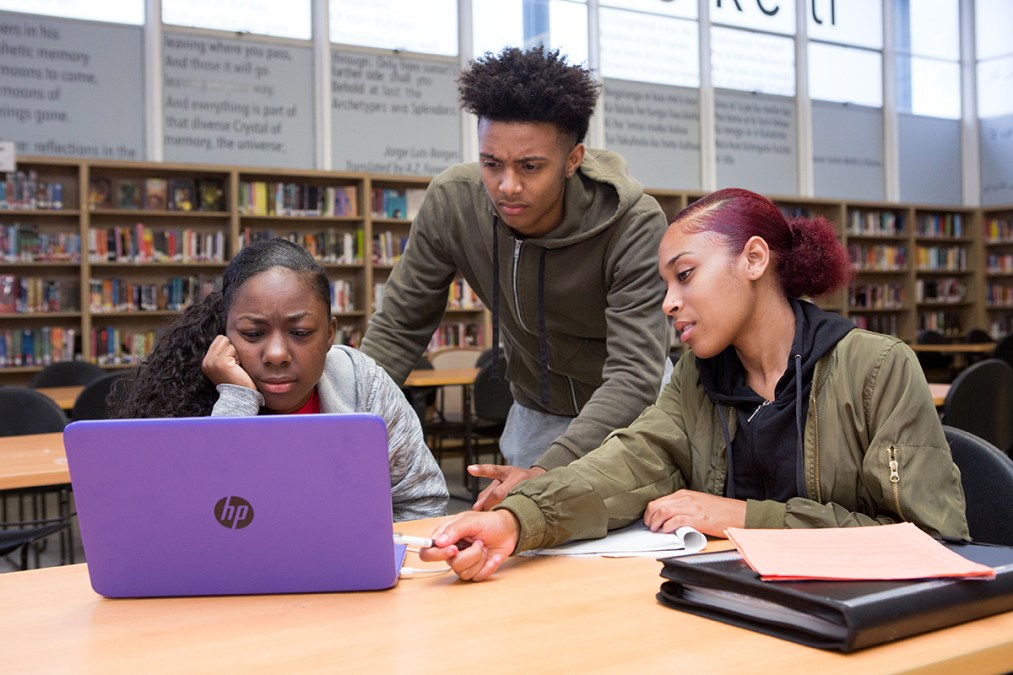New ‘digital citizenship’ curriculum helps students become responsible tech users

A strong understanding of digital citizenship is essential for students of all ages to be able to make smart choices online and in life. Meanwhile, technology is constantly changing and becomes outdated quickly, so there are always new and important skills that must be taught.
The new, free K-12 Digital Citizenship Curriculum from Common Sense Education has lessons for all ages to address the current technology landscape. Common Sense Education’s Kelly Mendoza, senior director of education programs, and Jamie Knowles, senior manager of educator learning programs, reviewed the new curriculum in a recent webinar hosted by edWeb called “ Digital Citizenship: New Lessons for a Changing World .”
Research from Project Zero at the Harvard Graduate School of Education shows that educators’ top concerns regarding digital citizenship are cyberbullying, sexting, fake news, and digital well-being. While the first three may cover some of the more obvious issues seen today, digital well-being examines screen time in general and what kids are using that time for.
“Not all [screen time] is created equal, and we really need to get kids thinking about balance in their lives and really thinking about what [quality screen time is] to them” Mendoza said.
The new curriculum has lessons for each grade level and also includes new resources, slides, and flexible documents that can be added to Google Drive or downloaded in various other formats.
The curriculum addresses six core topics:
- Media balance and well-being
- Digital footprint and identity
- Privacy and security
- Relationships and communication
- Digital drama, cyberbullying and hate speech
- News and media literacy
Here’s a closer look at how the curriculum covers some of these topics.
Digital drama, cyberbullying and hate speech
These lessons start in the younger grades with identifying and defining bullying behaviors, how they can occur, and how they make people feel. The higher grade levels have more complex discussions of the factors that can lead to bullying, different forms of bullying, and how to de-escalate harmful situations. The lessons at each level encourage students to be upstanders and teach them how to address situations as they occur.
Media balance and well-being
High school students spend an average of nine hours a day on entertainment media, so media balance and well-being is a topic of growing importance. It’s not necessarily about teaching kids what they should or shouldn’t do, but rather teaching them to reflect and evaluate how they spend their time. The lessons include guiding questions on topics like how media affects how they feel, the impact media has on their lives, and the impact media has on those around them.
News and media literacy
This topic is divided into three subareas: news literacy which looks at misinformation, credible sources, and validating news with secondary sources; media literacy, which dives into navigating photo and video manipulation, particularly in advertising; and creative credit, which explores online content creator rights and responsibilities as a consumer of online content. The lessons here help students learn to navigate their way around trustworthy vs. untrustworthy sources and learn more about being media creators and consumers.
When having a smartphone or tablet in hand becomes second nature for kids of all ages, strong digital citizenship skills are necessary for good decision making. A comprehensive digital citizenship curriculum can help students learn to use technology and participate online responsibly.
Learn more about the digital citizenship curriculum from Common Sense Education, here .
About the webinar presenters
Kelly Mendoza, senior director of education programs, oversees education program and content strategy for Common Sense Education, including the Digital Citizenship Curriculum, interactive games, and online professional development for K–12 schools. Her goal is to create curricula and programs that help schools create a positive culture around media and technology. She also has developed education resources and curriculum for Lucas Learning, the Media Education Lab, and PBS’s Frontline . Kelly has a Ph.D. in media and communication from Temple University. Follow her on Twitter at @kellymendoza .
As senior manager of Educator Learning Programs for Common Sense Education, Jamie Knowles creates online professional development services for teachers. Prior to his work at Common Sense, Jamie taught middle school English in Oakland, California, for eight years. For the 2016–2017 school year, Jamie received an Excellence in Teaching award and was one of three finalists for Teacher of the Year in Oakland Unified School District. While teaching, Jamie also successfully implemented a $200,000 school-wide blended-learning program funded by the Rogers Family Foundation and led professional development on a wide range of teaching strategies. Jamie holds a bachelor’s degree in philosophy from Eugene Lang College and a master’s degree in philosophy and education from Teachers College at Columbia University.
Join the community
Digital Learning & Leadership is a free professional learning community where you can share, learn, and discuss ideas and best practices to enhance teaching with technology.
The aforementioned broadcast was hosted by edWeb.net and Common Sense Education and sponsored by Symantec .
A recording of the edWebinar can be found here .




